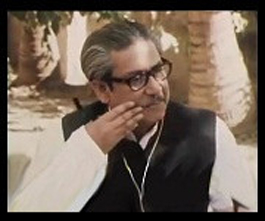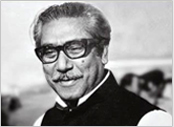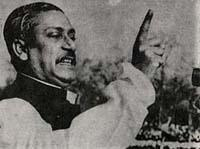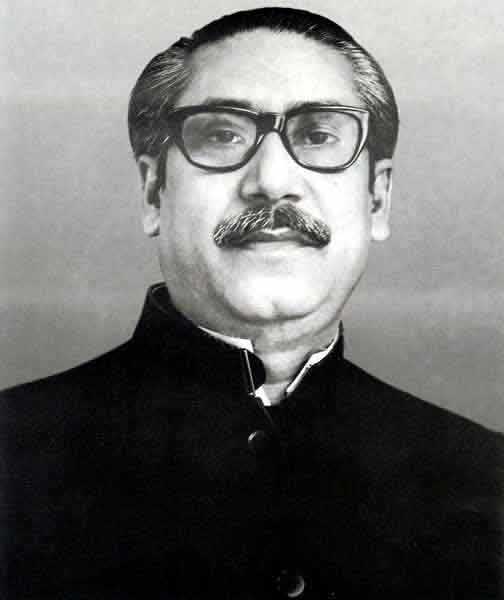 The nation will observe the historic March 7 on Monday in a befitting manner, commemorating the fiery and soulful address of Father of the Nation Bangabandhu Sheikh Mujibur Rahman on this day in 1971 when he made a clarion call to the people to fight against the Pakistani occupation forces to achieve the long-cherished independence.
The nation will observe the historic March 7 on Monday in a befitting manner, commemorating the fiery and soulful address of Father of the Nation Bangabandhu Sheikh Mujibur Rahman on this day in 1971 when he made a clarion call to the people to fight against the Pakistani occupation forces to achieve the long-cherished independence.
Before a mammoth rally at the then Race Course Maidan (now Suhrawardy Udyan) on March 7 in 1971, Bangabandhu in a virtual announcement of independence declared, “— ebarer sangram amader muktir sangram, ebarer sangram swadhinatar sangram (our struggle this time is the struggle for independence, our struggle this time is the struggle for liberation)”.
Bangabandhu, who became the undisputed leader of the then Pakistan following the massive victory of his party Awami League in the 1970 general elections, had to call upon his people to prepare for a fight when the Pakistani centrists were dilly- dallying to hand over power to the then majority party.
In the meantime, the Islamabad authorities were amassing modern arms and weapons in the then East Pakistan in a bid to resist the Bangalees who were fighting for their rightful causes since the creation of Pakistan in 1947.
Bangabandhu’s historic address on March 7 in fact mobilized the whole nation to wage an allout non-cooperation movement in the then East Pakistan, preparing for a bloody war against the Pakistani Army to achieve the independence. The whole nation, except a few pro-Pakistani elements, fought the Pakistani army for long nine months from March 25 in 1971 till achieving the ultimate victory on December 16 the same year.
Bangabandhu formally declared the independence of Bangladesh at 00-30 hours on March 26 (the night following March 25) in 1971 at his historic 32, Dhanmondi residence here. He was immediately arrested by the Pakistani authorities after declaration of the independence. Later, Bangabandhu was taken to the then West Pakistan where he had to spend long nine months in a dark condemned cell of a Pakistani jail.
President M Zillur Rahman and Prime Minister Sheikh Hasina in their separate messages on the occasion stressed the need for upholding the true spirit of the country’s hard-earned independence and sovereignty being imbued with the spirit of the Father of the Nation’s historic March 7 address.
The address of Father of the Nation Bangabandhu Sheikh Mujibur Rahman at Race Course Maidan (now Suhrawardy Udyan) on March 7, 1971, motivated the people highly and inspired them to the War of Liberation, they said.
The President and the Prime Minister said Bangabandhu’s proclamation of independence of the country on March 26, 1971, the Charter of Emancipation of the Bengali nation, was continuation of his March 7 address.
The day is historic and memorable and it would ever be remembered by the Bengali nation, they said. They also expressed firm belief that Bangabandhu’s March 7 address would remain as a source of inspiration for the nation for ever.
Bangladesh Awami League has drawn up elaborate programmes to observe the day in a befitting manner. The day’s progarmmes will begin with hoisting of national and party flags at Bangabandhu Bhaban and central office of the party at 6.30 am. It will be followed by placing wreaths at the portrait of the Father of the Nation in front of Bangabandhu Bhaban at 7 am.
Prime Minister and Awami League President Sheikh Hasina will address as the chief guest a discussion organized by her party at Bangabandhu International Conference Centre at 3 pm.
Different associate organizations of the party including Mohila Awami League, Awami Jubo League, Jubo Mohila League, Krishak League, Chhatra League, Sramik League, Sechchhasebak League and Bangabandhu Sangskritik Jote and different socio- cultural organizations have also chalked out elaborate programmes on the occasion.
Bangladesh Betar, Bangladesh Television and private TV and radio stations will air special programmes, while national dailies will publish articles highlighting the significance of the day. Besides, Bangabandhu’s March 7 address and the inspirational patriotic songs of the War of Liberation will be played across the country.
News Source: BNN
 Speakers at a meeting yesterday recalled Father of the Nation Bangabandhu Sheikh Mujibur Rahman with deep gratitude for his relentless efforts to turn South Asian region into a model of secularism.
Speakers at a meeting yesterday recalled Father of the Nation Bangabandhu Sheikh Mujibur Rahman with deep gratitude for his relentless efforts to turn South Asian region into a model of secularism.









